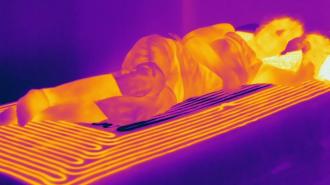This smart mattress will help you fall asleep fast
A new smart mattress helps people fall asleep fast by heating and cooling their body in all the right places. If the tech is commercialized, it could potentially help millions of people get a better night’s rest.
The challenge: The average person falls asleep less than 20 minutes after going to bed, but an estimated 10% of Americans suffer from chronic insomnia, which officially means they have trouble falling asleep and staying asleep at least three times a week for three months.
This consistent lack of sleep can negatively affect their physical and mental health, leading to diabetes, high blood pressure, depression, and more. Even if the problem isn’t chronic, a single sleepless night can leave a person feeling foggy-headed and irritable the next day.
There are prescription medications that can help a person fall asleep fast, but they can be habit-forming, cause unwanted side effects, and generally aren’t recommended for people suffering from chronic insomnia.
Participants fell asleep 58% faster and their quality of sleep was “significantly improved.”
S. Haghayegh et al.
Sleep on it: Bioengineers at UT Austin have now built a smart mattress and pillow that helps people fall asleep fast by manipulating their core body temperature.
This mimics a function of the circadian clock that regulates your 24-hour sleep-wake cycle — about two hours before bedtime, it triggers a slight lowering of your core body temperature, which produces a feeling of drowsiness.
How it works: Embedded within the UT Austin team’s mattress are systems that circulate either water or air. In the central part of the mattress, this water or air is cool, but in the pillow and around the edges of the mattress — near a sleeper’s hands and feet — it’s warm.
For a small study, 11 people tried to fall asleep on the smart mattress about 2 hours before they would normally go to bed (when they shouldn’t naturally be tired). Some nights, the cooling and heating functions were turned on for 30 minutes after lights out; some nights, they weren’t.
On the nights when the functions were on, participants fell asleep 58% faster and their quality of sleep was “significantly improved,” according to the UT Austin team.
“It is remarkable how effective gentle warming along the cervical spine is in sending a signal to the body to increase blood flow to the hands and feet to lower the core temperature and precipitate sleep onset,” said researcher Kenneth Diller.
Bonus feature: The study was small and the participants were all “normal” sleepers, so we don’t know for sure that the smart mattress would be as effective at helping people suffering from insomnia fall asleep fast, but it seems plausible that the mechanism would translate.
The researchers are now looking for a partner to help them commercialize the tech, which they’ve already patented. If they’re successful, the next mattress you buy might not only help you sleep, but maybe improve your cardiovascular health, too.
“[The mattress] also enables the blood pressure to fall slightly overnight, with the benefit of allowing the cardiovascular system to recover from the stress of maintaining blood flow during daily activities, which is highly important for long-term health,” said Diller.
We’d love to hear from you! If you have a comment about this article or if you have a tip for a future Freethink story, please email us at [email protected].





